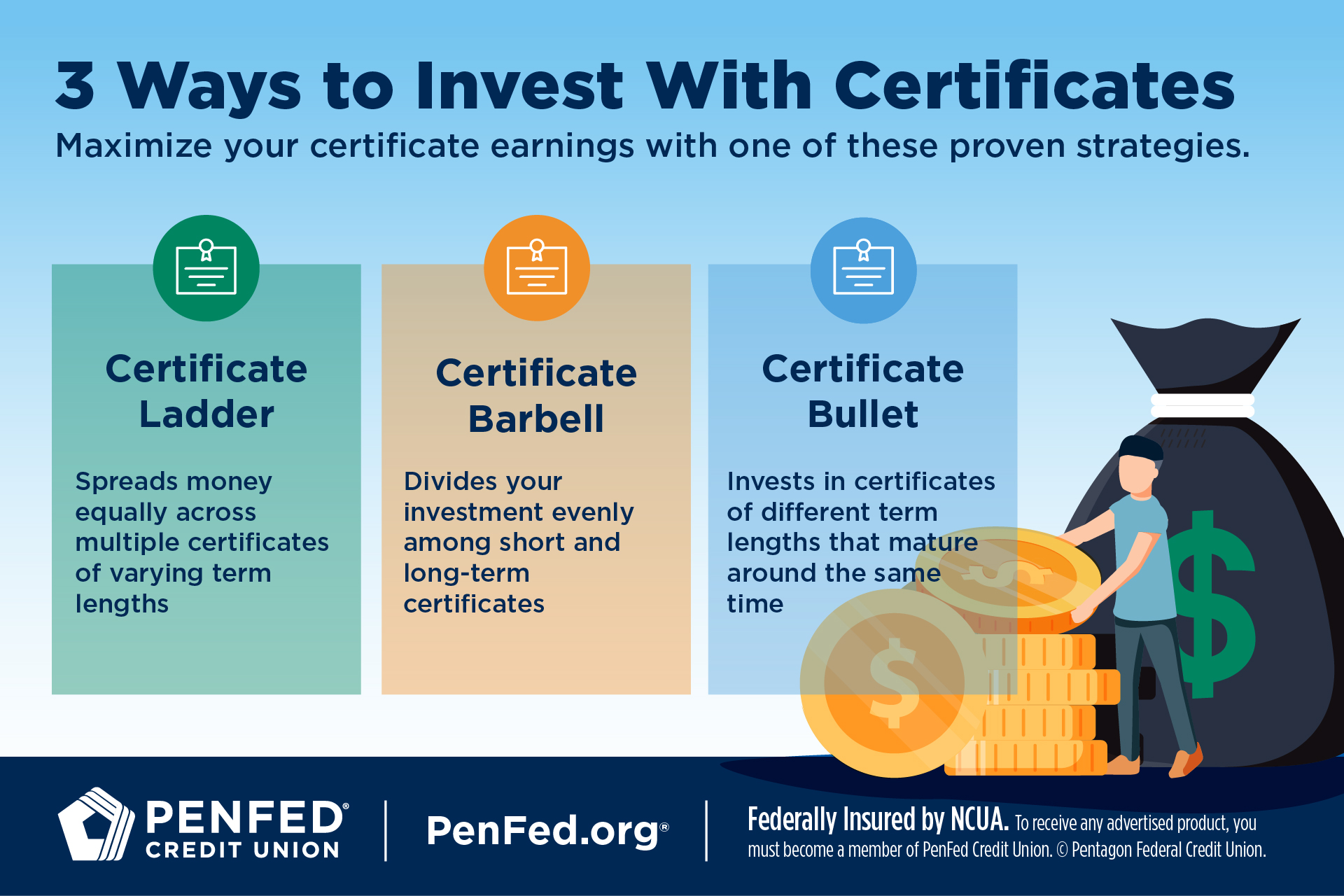CHECKING & SAVINGS
3 Proven Certificate Investment Strategies
What you'll learn: How to invest in certificates
EXPECTED READ TIME: 5 MINUTES
While aggressive stock options and risky investments may offer lucrative returns, a certificate account is a safe, reliable way to grow your money at a steady pace. Though your earnings may be lower with a certificate, the tradeoff is that you'll receive a guaranteed rate of return.
Whether you're nearing retirement and want a predictable return or you're saving up for a large purchase and don't need to access your money while it grows, a certificate could be one of your best options.
Let's take a look at exactly what is a certificate and three ways you can maximize your investment.
What We’ll Cover

Certificate Account Definition
A certificate is the credit union version of a certificate of deposit (CD) typically found at a bank. Like a CD, a credit union certificate is an account that locks in your money and earns dividends over a period of time.
How much you earn depends on the financial institution, your deposit amount, and the length of your term. In most cases, the longer the certificate term, the higher the earnings. There are also certificate accounts that increase their yield over time.
Along with a high yield, one of the main benefits of a certificate is that it offers a guaranteed return, unlike some other types of accounts. That's why certificates are a safe investment option. With a credit union, your money is protected by the National Credit Union Administration (NCUA) up to $250,000.
How a Certificate Works
When you open a certificate account, you select a term, typically ranging from several months to several years. The money you deposit into that account is then locked in until the end of the term (known as the maturity date). If you choose to withdraw your money before the maturity date, you'll pay an early withdrawal penalty. This penalty may either be a flat fee, or a percentage based on the length of time before your maturity date.
Certificate Investment Strategies
While investing in a single certificate can help you earn more than a regular savings account can, several strategies can help you maximize your earnings, each with their own advantages and downsides.
Certificate Ladder
What it is: A certificate ladder is a strategy that uses various terms, equally spaced apart like a rung on a ladder. Once each account matures, you can continue the ladder by reinvesting the proceeds. If you continue the ladder, each certificate will be reinvested so a certificate matures each year.
How it works: For example, you want to invest $5,000 across five certificate accounts. You'll put $1,000 into each certificate, with one maturing a year after the next. This could mean putting $1,000 in a one-year certificate, another $1,000 in a two-year certificate, and so forth up to five years. To continue the ladder, when the first one matures, you'll put it into a five-year certificate and do the same for all the other ones.
Pros and cons: The main benefit of this approach is its flexibility. Since you're not tying up all your funds in one account, you can decide one year you want to access the money once the certificate matures. It also helps you diversify by taking advantage of varying certificate yields across different terms. Ideally, by the time a certificate matures, yields will be higher, helping you earn more.
The downside is that yields can decrease and tie up your money. If you need cash, it's best to make sure you keep some money more accessible.
Certificate Barbell
What it is: A certificate barbell is similar to a certificate ladder except you divide your investment into short and long terms. Once the certificate with the shorter term matures, you can choose to reinvest it in long or short terms, depending on market yields. That way, you don't have to tie up all your money on long-term certificates while you're waiting for yields to rise.
How it works: For example, you have $6,000 you want to divide up into a short- and long-term certificate. You'd then take $3,000 and put it into a five-year certificate and the remainder into a six-month certificate. Once the six-month certificate matures, you can then check the yields of other terms to see which is the highest. If yields went up on five-year certificates, you can invest in that or wait and reinvest it into another six-month certificate.
Pros and cons: This approach allows you to frequently access your cash until you're ready to invest it into a longer term. It also helps you take advantage of higher yields. However, you could miss out on higher yields if you decide to invest your short-term certificate into a five-year account once it matures.
Certificate Bullet
What it is: A certificate bullet aims to invest in different terms that'll mature around the same time. As you open new accounts, these terms will be shorter than the one that was opened first. You'll let all the accounts mature without reinvesting any of the funds.
How it works: For example, you want to use your funds in five years, so you start by opening a five-year certificate. The next year, you open another certificate that matures in four years. Two years in, you open another account that'll mature in three years, and so on. Once the five-year certificate matures, so will all the other ones.
Pros and cons: The certificate bullet strategy is a great choice if you know you'll need a large sum of money to meet a short-term goal, like purchasing a car or a house. Using this strategy will help you earn higher yields on funds you've saved up after you opened your initial certificate. Think of it like a reverse certificate ladder.
Like the other strategies, the risk is in missing out on potentially higher yields in the future. That's because you're not reinvesting your funds or diversifying it across longer terms, and therefore higher yields over time.
Your Next Steps
Now that you understand some of the strategies you can use to invest in certificates, you can do your research to find the best yields. Then, determine which strategy works best, how much you want to invest, and how many certificate accounts to open.
See the Latest Certificate Yields
Find out how much you could earn with our certificates.
See the Latest Certificate Yields
Find out how much you could earn with our certificates.




